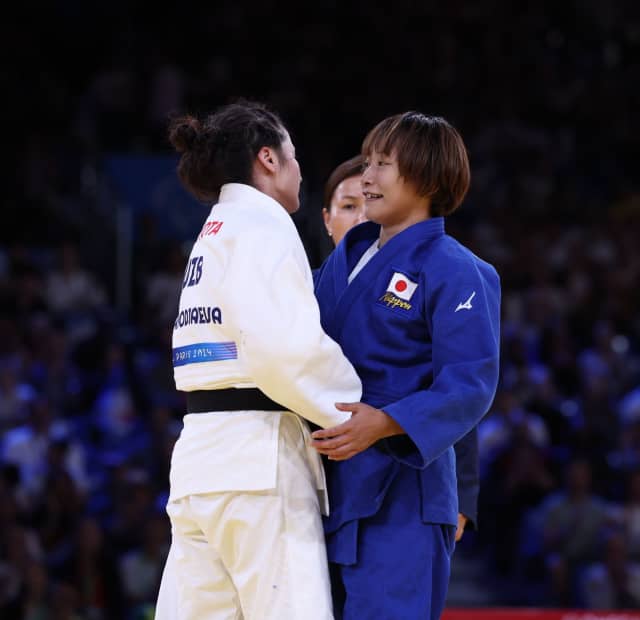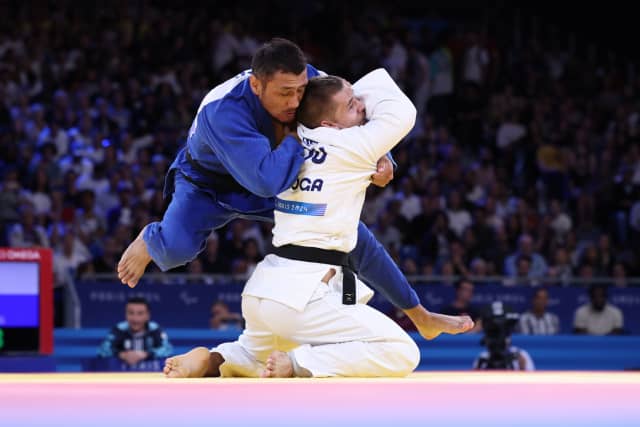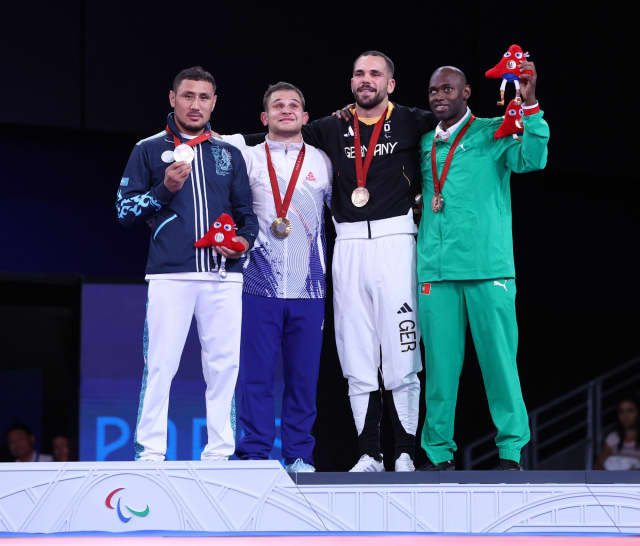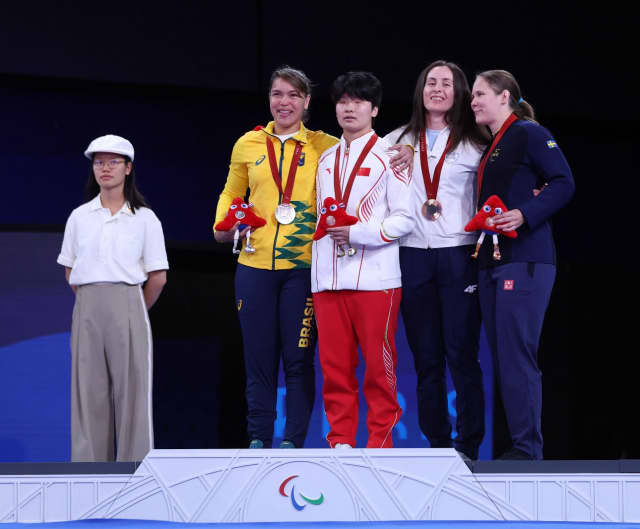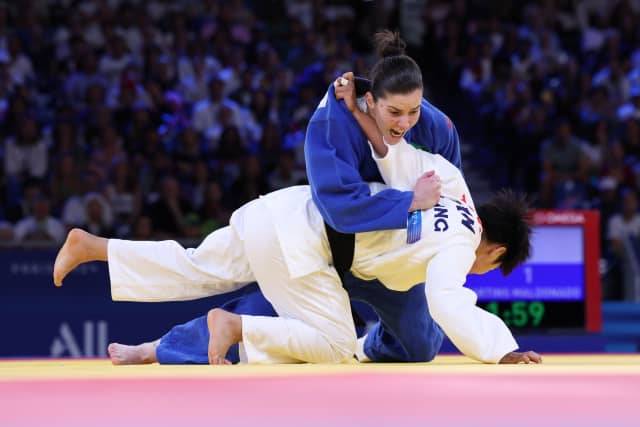J2 -57 kg: Japan Wins their First Gold Medal with Hirose
A scenario already observed in other categories was repeated in the women's J2 -57 kg group, since it was the two top seeds, Kumushkhon Khodjaeva (UZB) and Junko Hirose (JPN), who pulled out all the stops to face each other in the final.
The Uzbek passed through a line-up of Jianan Wang (CHN) and Marta Arce Payno (ESP) without a hitch, while the Japanese judoka sent Laura Candela Gonzales (ARG) and Dayana Fedossova (KAZ) to the locker room. It remained to be seen whether the world ranking between Khodjaeva (1) and Hirose (2) would be respected all the way to the end of the day.
Bronze medallists at the Tokyo Paralympic Games, both Khodjaeva and Hirose were promised a better result this time. The final began calmly, the two judoka gauging each other, when Junko Hirose produced a big effort to score a beautiful ippon in perfect Japanese style. It was a first gold medal for Japan.
2022 World Champion Dondu Yesilyurt (TUR) came back from the bottom of the repechage and had a chance to win the bronze medal against Dayana Fedossova (KAZ). Yesilyurt never really looked like being in the position to score and she was twice countered by Fedossova for a clear victory.
The second contest for a bronze medal saw Lucia Da Silva Teixeira Araujo (BRA) and Marta Arce Payno (ESP) face each other. Before Paris 2024, both judoka were three times Paralympic medallists. One of them was about to win another medal. With a first makikomi for waza-ari after only a few seconds, Marta Arce Payno took an option on the victory. The score was then changed to ippon offering a brilliant fourth Paralympic medal to the Spaniard.
Final Results 1. Junko Hirose (JPN) 2. Kumushkhon Khodjaeva (UZB) 3. Dayana Fedossova (KAZ) 3. Marta Arce Payno (ESP) 5. Dondu Yesilyurt (TUR) 5. Lucia Da Silva Teixeira Araujo (BRA) 7. Jianan Wang (CHN) 7. Laura Candela Gonzales (ARG)
J1 -73 kg: Bologa on Top of the Paralympic Games
There were tension and high stakes this morning in the men's J1 -73 kg category. The journey of the number one seed Florin-Alexandru Bologa was not easy and he had to dig into his reserves to eventually reach the final after eliminating Shokhrukh Mamedov (UZB) in the first round, then Harlley Damiao Pereira Arruda (BRA) in the semi-final, two men that we found later on in the final block.
Being the favourite does not always give a clear advantage over the competition but Florin-Alexandru Bologa knew how to manage the pressure perfectly and find the gaps in his opponents' defence.
The number 2 seed of the tournament, the German Lennart Sass, hoped to be able to do the same but it was finally the 4th seed, Yergali Shamey (KAZ), who managed to join Bologa in the final.
Two times bronze medallist at the Paralympic Games and two times European champion, Florin-Alexandru Bologa had a strong opponent in front of him with the 2022 world champion Yergali Shamey (KAZ). After thirty seconds, Bologa produced a huge effort and scored a first waza-ari with an almost perfect seoi-otoshi. The Romanian judoka stayed focussed and a few seconds later again threw with a seoi-otoshi to win a well deserved and fantastic Paralympic title.
The first bronze medal was the result of the fight between Shokhrukh Mamedov (UZB) and Lennart Sass (GER). The German Judoka was the first in action scoring a waza-ari with a powerful harai-goshi. Mamedov had no other choice but to take some risks, which once again benefited Lennart Sass who countered for a second waza-ari. The bronze medal goes to Germany.
To complete the podium, it was necessary to wait for the result of the contest between Djibrilo Iafa (POR), two times European para-judo medallist, and Harlley Damiao Pereira Arruda (BRA), gold medallist at the Pan-American para-judo championships. Iafa and Pereira Arruda offered a spectacular contest, with flying ippon-seoi-nage and aerial tomoe-nage techniques. It was with the latter that Djibrilo Iafa scored a waza-ari with less than a minute to go, enough to win the bronze medal.
Final Results 1. Florin-Alexandru Bologa (ROU) 2. Yergali Shamey (KAZ) 3. Lennart Sass (GER) 3. Djibrilo Iafa (POR) 5. Shokhrukh Mamedov (UZB) 5. Harlley Damiao Pereira Arruda (BRA) 7. Dongdong Camanni (ITA) 7. Armindo Rodrigues (FRA)
J1 -70 kg: In the End the Title Goes to China and Liu
The number one seed, China's Li Liu, seemed untouchable all morning. One by one, she overcame the obstacles that stood in her way to enter the final. Her first opponent Nadia Iano Allegre (ARG), as well as the next, Nicolina Pernheim Goodrich (SWE) suffered the Chinese law and could do nothing to prevent Liu from advancing in the tournament.
With the hierarchy respected at the top of the draw, it was mirrored in the second half, since it was Brenda Souza De Freitas (BRA), the number 2 seed, who obtained her ticket for the final after disposing of Merve Uslu Hajabipour (TUR) and Theodora Paschalidou (GRE).
Brenda Souza De Freitas being more active during the initial part of the final, Li Liu was penalised a first time. A strong battle between the two judoka then began and the Brazilian judoka seemed to counter her opponent. Ippon was announced but the video clearly showed that there was no action; back to one shido on Liu's side only. With less than a minute left, it was actually Li Liu who countered her opponent to score the first waza-ari, while Souza De Freitas received a penalty. Once again, the action had to be verified and the score was cancelled. It was time for golden score. It took only a few seconds for Liu to pin down her opponent and win the title after a long period of suspense.
The two seeds having shared the gold and silver, it remained to be seen who would win the two bronze medals. Turuunaa Lkhaijav (MGL) and Theodora Paschalidou (GRE) faced each other for the first bronze medal. Paschalidou did not leave any space for chance and scored waza-ari followed by an immobilisation to win a bronze medal.
So we found Merve Uslu Hajabipour (TUR) facing Nicolina Pernheim Goodrich (SWE) in the second bronze medal contest. Once again there was no space for chance, just hard work. Nicolina Pernheim Goodrich scored twice with waza-ari, the second one with a massive harai-goshi to win an indisputable bronze medal.
Final Results 1. Li Liu (CHN) 2. Brenda Souza De Freitas (BRA) 3. Theodora Paschalidou (GRE) 3. Nicolina Pernheim Goodrich (SWE) 5. Turuunaa Lkhaijav (MGL) 5. Merve Uslu Hajabipour (TUR) 7. Nadia Boggiano Alegre (ARG) 7. Matilde Lauria (ITA)
J2 -73 kg: Seto Sets the Tone for Japan
It was some high-flying judo that we witnessed in the men's J2 -73 kg category, to the great delight of a captivated audience. In a purely Japanese style the number 1 seed, Yujiro Seto (JPN), made a strong impression and qualified masterfully for the Paralympic final, beating Shao-Hao Chang (TPE) and Osvaldas Bareikis (LTU) in the process.
The Frenchman Nathan Petit had a double advantage, that of being the number one seed and of fighting on home turf in front of a raging crowd. Unfortunately, this was not enough for him to join Seto in the final and the Frenchman had to settle for a chance to win bronze, which is in itself an achievement.
The second part of the draw remained undecided for a long time. With Nathan Petit defeated by Uchkun Kuranbaev (UZB), we thought that the latter had done the hardest part but that was without counting on Giorgi Kaldani (GEO) who let his joy explode after his victory in the semi-final against Kuranbaev.
Only 5 seconds were necessary for Seto to score a first waza-ari with a seoi-otoshi. Mastering the moves on the tatami, Seto’s second score came a little later with a subtle de-ashi-barai. The gold medal was for Seto and Japan.
Donghoon Kim (KOR) and Uchkun Kuranbaev (UZB) formed the first duo to go for bronze. With a precise and opportunistic ashi-waza, Uchkun Kuranbaev scored waza-ari to win the bronze medal.
France therefore still had a chance to win a medal with Nathan Petit (FRA), opposed by Osvaldas Bareikis (LTU). The least we can say is that Petit was dominating while Bareikis became more and more exhausted as the contest unfolded. In judo, what is important is to score though, which Bareikis did with a seoi-otoshi for a waza-ari. Petit pushed and pushed but was not able to come back. The bronze medal was for Osvaldas Bareikis (LTU).
Final Results 1. Yujiro Seto (JPN) 2. Giorgi Kaldani (GEO) 3. Uchkun Kuranbaev (UZB) 3. Osvaldas Bareikis (LTU) 5. Donghoon Kim (KOR) 5. Nathan Petit (FRA) 7. Shao-Hao Chang (TPE) 7. Daniel Vargoczki (ROU)
J2 -70 kg: Brazil and Martins Maldonado Conclude With Gold
To conclude this second day of competition, we witnessed a domination of the top seeds once again. Unsurprisingly but with panache, Yue Wang (CHN) offered a new chance of a medal to the Chinese delegation after beating the Georgian Ina Kaldani in the semi-final.
For her part, Alana Martins Maldonado (BRA) disposed of Kazusa Ogawa (JPN) in order to join Wang in the final.
The final was tense between Martins Maldonado and Yue Wang, but the Brazilian judoka went halfway to the top of the podium after she scored a first waza-ari. The second half is sometimes more difficult but again Alana Martins Maldonado executed a skilful sasae-tsuri-komi-ashi to win the gold medal for Brazil.
Kelly Victorio (BRA) and Kazusa Ogawa (JPN) faced each other for the first bronze medal. A head shorter than her opponent, it was clear that Ogawa would try to go under the centre of gravity of Victorio, which she did to score a first waza-ari with seoi-otoshi. She doubled the score with only a few seconds remaining on the clock to win the bronze medal.
Ayala Mereke (KAZ) and Ina Kaldani (GEO) still had a chance to complete the podium. It was a close contest, neither Mereke nor Kaldani being able to score during normal time. Eventually, during the golden score period, Ina Kaldani managed to counter Mereke to score waza-ari and steal the bronze medal.
Final Results 1. Alana Martins Maldonado (BRA) 2. Yue Wang (CHN) 3. Kazusa Ogawa (JPN) 3. Ina Kaldani (GEO) 5. Kelly Victorio (BRA) 5. Ayala Mereke (KAZ)


